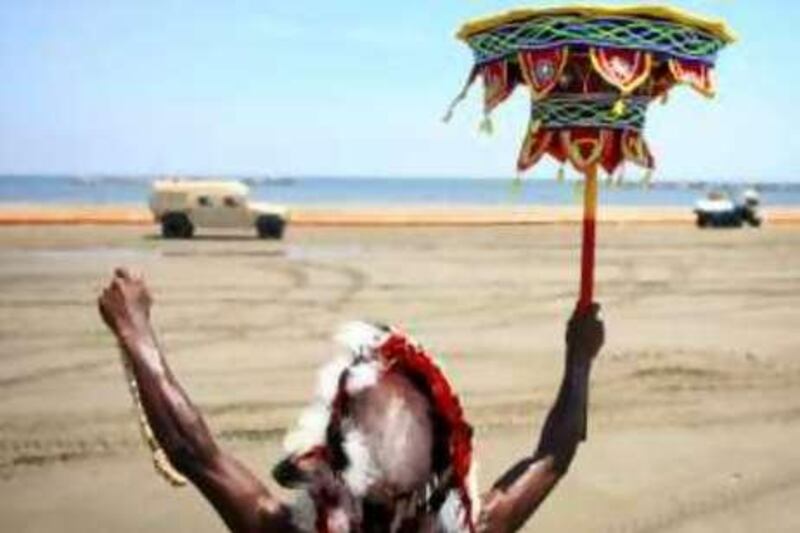MYRTLE GROVE, LOUISIANA // A sign by the main road down in the Mississippi River delta said it all: "Damn BP. God Bless America." It succinctly expressed what many in Louisiana now feel almost six weeks after a BP-contracted oil rig some 68km out in the Gulf of Mexico blew up on April 20 and which has spewed oil ever since.
BP's failure to stop the massive oil spill, estimated by some US government scientists at up to 19,000 barrels a day, sparked demonstrations in cities across the United States on Monday, when most residents were off work for the Memorial Day holiday to honour US war dead. But in the Gulf Coast, a region where the oil and gas industry is the biggest employer, with fishing coming in second, the people closest to and hardest hit by the environmental damage have also maintained their faith in the oil industry, if not BP as a company.
The US administration's suspension last week of all deepwater drilling operations in the Gulf of Mexico was greeted with dismay by workers in all sectors dependent on the industry, ranging from catering to engineering. "It's bad enough that we have an oil spill to deal with and the fishermen can't work. Now they're going to take away the oil industry and we'll have nothing," said Chett Chiasson, executive director of the Greater Lafourche Port Commission, which runs Port Fourchon, the launching point for 90 per cent of the deepwater activities in the Gulf of Mexico.
The slick has spread over 160km of Louisiana's coast, but Mississippi and Alabama have escaped lightly so far, with only scattered tar balls and oil debris reaching its coasts. However, the National Oceanic and Atmospheric Administration forecast was a sober reminder that oil from the unchecked spill, broken up and carried by winds and ocean currents, could threaten a vast area of the US Gulf Coast, including the tourism mecca Florida, as well as Cuba and Mexico.
With the hurricane season starting officially yesterday amid forecasts of tough storms ahead, BP was embarking on yet another effort to stem the flow of oil. It was again trying to use a dome to funnel some of the leakage, but this time in the hope of avoiding some of the technical difficulties it encountered in a similar effort some three weeks ago. Many people in Louisiana have lost faith after BP's last attempt to plug the well with mud and other materials called "top kill" was declared a failure on Saturday. Many now believe only a relief well will stop the flow and this was not expected to be completed until August.
Barack Obama on Monday called the oil spill, now larger than the 1989 Exxon Valdez disaster, "as enraging as it is heartbreaking". Carol Browner, the president's energy adviser, said it was probably "the biggest environmental disaster we have ever faced in this country". Many questions surround possible regulatory failures and BP's culpability, particularly after a New York Times report on Sunday cited internal misgivings about its own safety standards by ignoring warnings about design flaws in the well.
Eric Holder, the attorney general, was expected to visit the Gulf Coast yesterday after several lawmakers asked the justice department to investigate legal responsibility. But the hope of some kind of reckoning was of little consequence to those people living on the Gulf Coast with the likelihood that the worst in terms of environmental damage had yet to come. "I keep hoping I'm going to wake up and the oil has stopped but the chances are we're going to have to wait until August," said Foster Creppel, a local environmental activist and hotel owner, who has long campaigned for the preservation of the Mississippi River delta's wetlands.
He explained that the Mississippi River's natural flooding and subsequent replenishment of the land used to be similar to the role played by the Nile in Egypt. But the Mississippi had long been curtailed by a system of levees and canals built to facilitate the oil industry's needs but at the cost of land loss and greater susceptibility to hurricane damage. Around a football pitch's worth of land was lost each hour by erosion, he said.
Nonetheless, he was not against the oil industry and recognised its importance to the local and national economy but he hoped the oil spill would at least amount to a wake-up call for the need for stringent regulatory control. "I'm not necessarily for a ban on offshore drilling but people have to understand what that one-in-a-million chance of something going wrong means because it's actually happened," he said. "We need much greater government control and oversight."
Bookings at his hotel, usually favoured by vacationing fishermen, was down around 60 per cent compared with the corresponding time last year and he had started the process of claiming compensation promised by BP. BP's total financial cost of the response to the disaster now stands at about US$930 million (Dh3.4 billion) and is expected to rise substantially. Meanwhile, Mary Landrieu, a Democratic senator for Louisiana, has demanded the company invest $1bn in wetlands protection.
"Companies have done a lot of damage around here and even if it costs a little more to do things safely, they have made enough profits to do this," said Mr Creppel. "BP are trespassers and they owe us money at the least." @Email:sdevi@thenational.ae






